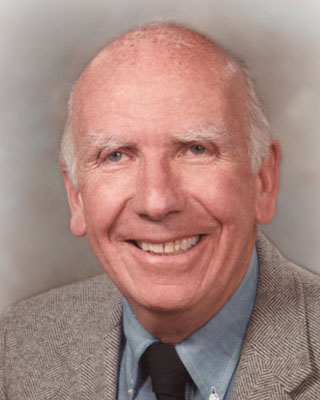by Jo Knopoff
I would like to thank everyone here for coming to honor the memory of my dearest Leon. The large number of you reflects the high regard in which Leon was held by colleagues and friends. Special thanks to those of you who spoke, who will be sharing memories, and who helped in other ways today.
You will understand, I know, if I find it difficult to stand before you to talk about Leon. I miss him too much to be sure that I can speak the words that I want to. He was the most wonderful companion and husband and father, as well as being an extraordinary scientist and teacher. We had a lifetime of happiness together sharing our joy in our children, our love of music, of travel, of hiking, of going to museums and plays, of being with our friends and his colleagues, of going anywhere together, of just being together – with each other.
Music played such an important role in both of our lives – classical music foremost, but Gilbert and Sullivan, too, and, amazingly, our musical tastes were almost identical. Not that I could match his expertise in playing the piano and harpsichord and knowing so much music so well. Together we enjoyed countless concerts and musical evenings at home. How I miss looking to him for his reaction after a concert, or hearing a few bars of music on the radio and having him tell me the composer, the piece, and the movement!
Shortly after we first met, we went on our first hike together, and we continued hiking and backpacking in the beautiful mountains that we both loved until just a few years ago, not that I could ever match his expertise in both, or his ability to climb.
We both loved the adventure of travel and eagerly went to new places, and treasured trips to the places that we loved, like London, Cambridge, and Paris. Sabbaticals gave us a chance to know places thoroughly and to travel a great deal, very often with the pleasure of going with our children.
Both of us loved going to museums, whether of art or history or nature, and we were among the few people, other than our children, who could happily spend hours longer there than anyone else we knew.
Leon enjoyed being with friends, as I did, yet we were satisfied just to be with each other. Our dinner table conversations were particularly interesting, because Leon had an encyclopedic knowledge in so many fields. And he liked looking things up – which he then remembered.
I treasured Leon because of his remarkable qualities as a person. He didn't tell other people how to live their lives – his modesty would not have allowed that, but he demonstrated how to live one's life in the best possible way: by the example of the way he lived his. He was loving, kind, generous, loyal, and proud of the accomplishments of his wife and his children and of his students. He had a great sense of fun, and he made me laugh. Very patient, he rarely criticized (that does not count the lively discussions he enjoyed on scientific topics with students and colleagues!) and he rarely complained, even during the medical travails of his ever-declining health in his last years. He was a happy man, because he loved with a passion: science, teaching, his children, and me – the things that made his life meaningful.
Two days before he died, when Rachel and her fiancé Russ told him that they loved each other and planned to be married, Leon said, "I hope that you will be as happy as we have been."
I know how fortunate I was to spend most of my life with Leon, and I think that no one could have been happier than we were.
 L E O N K N O P O F F ____________________________________________________________________________________________________________
L E O N K N O P O F F ____________________________________________________________________________________________________________